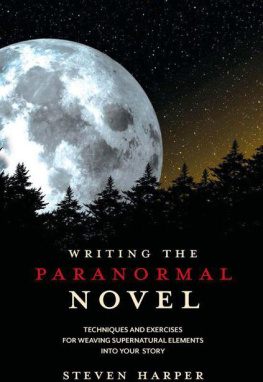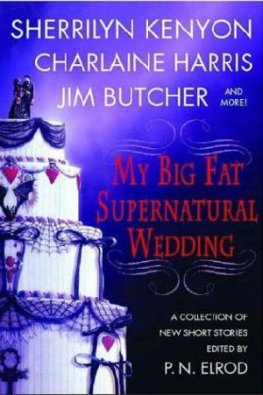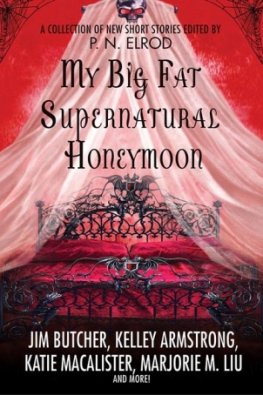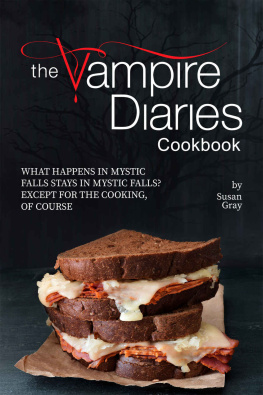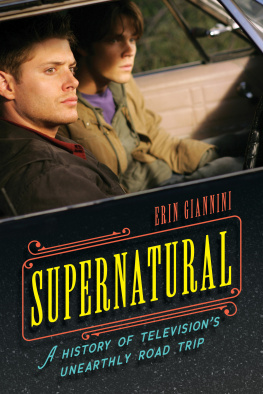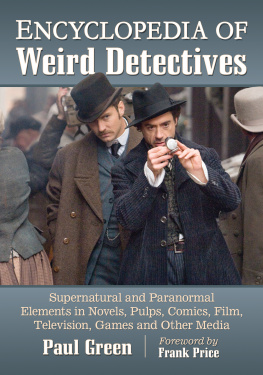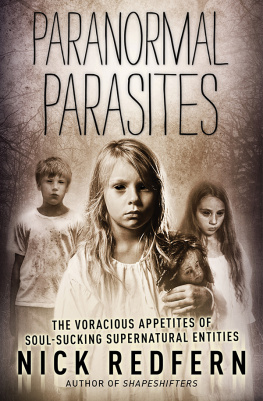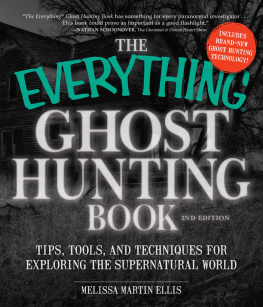WRITING THE
PARANORMAL
NOVEL
TECHNIQUES AND EXERCISES
FOR WEAVING SUPERNATURAL ELEMENTS
INTO YOUR STORY
STEVEN HARPER

Writing the Paranormal Novel . Copyright 2011 by Steven Harper Piziks. Manufactured in the United States of America. All rights reserved. No other part of this book may be reproduced in any form or by any electronic or mechanical means including information storage and retrieval systems without permission in writing from the publisher, except by a reviewer, who may quote brief passages in a review. Published by Writer's Digest Books, an imprint of F+W Media, Inc., 4700 East Galbraith Road, Cincinnati, Ohio 45236. (800) 289-0963. First edition.
For more resources for writers, visit www.writersdigest.com/books.
To receive a free weekly e-mail newsletter delivering tips and updates about writing and about Writer's Digest products, register directly at http://newsletters.fwpublications.com.
15 14 13 12 11 5 4 3 2 1
Distributed in Canada by Fraser Direct
100 Armstrong Avenue
Georgetown, Ontario, Canada L7G 5S4
Tel: (905) 877-4411
Distributed in the U. K. and Europe by F+W Media International
Brunel House, Newton Abbot, Devon, TQ12 4PU, England
Tel: (+44) 1626-323200, Fax: (+44) 1626-323319
E-mail: postmaster@davidandcharles.co.uk
Distributed in Australia by Capricorn Link
P. O. Box 704, Windsor, NSW 2756 Australia
Tel: (02) 4577-3555
Library of Congress Cataloging-in-Publication Data
Piziks, Steven.
Writing the paranormal novel: techniques and exercises for weaving supernatural elements into your story/by Steven Piziks. 1st ed.
p.cm.
ISBN 978-1-59963-134-9 (alk. paper)
eISBN 13: 978-1-5996-3301-5
1. Occult fiction Authorship. 2. Occult fiction Technique. I. Title.
PN3377.5.O33P59 2011
808.3'873 dc22
2010034603

Edited by Scott Francis
Designed by Claudean Wheeler
Cover photo by inhauscreative/iStockphoto.com
Production coordinated by Debbie Thomas
ABOUT THE AUTHOR

Steven Harper Piziks is the author of In the Company of Mind and Corporate Mentality , both science fiction books published by Baen Books. Writing as Steven Harper for Roc Books, he has produced The Silent Empire series for Roc and is currently writing The Brain Plague steampunk trilogy for DAW. He's also written books based on Star Trek, Battlestar Galactica , and The Ghost Whisperer , as well as the movie novelization Identity . When not writing, he plays the harp, wrestles with his three sons, and spends more time online than is probably good for him.
www.sff.net/people/spiziks
www.twitter.com/stevenpiziks
TABLE OF CONTENTS
PART I: GATHERING THE ELEMENTS

CHAPTER 1: The Nature of the Paranormal

W elcome to a wonderful world of weird. You can find just about anything here: lovely bones, lightning thieves, graveyard books, wild swans, half magic. The list is as endless as imagination. And you've decided to write in it. Cool!
We do have a few rules. Sorry, but there it is. You can't do just anything . You only get three wishes. The magical gate closes at sunset. The handsome stranger doesn't drink wine. Even the supernatural world has its little ways.
Don't fret. We'll walk you through, open all the doors, and reveal all the secrets. Please keep your arms and legs inside the tour bus at all times (lest they get bitten off) and remember to tip the driver (he gets testy if you don't). And at the end of it, you'll have your own paranormal manuscript.
JUST WHAT IS A PARANORMAL BOOK, ANYWAY?
If you want to write science fiction bear with me here you have to create a story with some piece of extrapolated science (such as dinosaur cloning or the ability to zap a corpse back to life) that's so integral to the plot, you can't remove it without destroying the story. Remove the cloned dinosaurs from Jurassic Park , and you have no story. Remove the reanimated dead from Frankenstein , and you have no story. Science is the element that makes these novels into science fiction instead of, say, adventure or romance or gothic.
Paranormal novels work the same way. You need some element of magic or the supernatural that's so deeply integral to the story that the entire novel would collapse if you removed it. Try removing the supernatural element from Dracula and see how far you get. The book has a romance, but without the vampire count to move things along, author Bram Stoker would have no story. On the other hand, if your protagonist's werewolf boyfriend could just as easily be a muscular guy who loses his temper once a month right around the time he needs a haircut, you aren't writing a paranormal novel, you're probably writing a romance with supernatural trappings and your readers will see right through it.
People have been telling supernatural stories from the beginning of human civilization. Such stories form the basis of every mythology that ever existed. These tales explain how the world came to exist, why we have earthquakes, who stole fire from the gods, where people go when they die, or anything else that needed explaining. Other supernatural stories spin grand adventures of bold heroes: Odysseus and Gilgamesh and Lemminkinen and Aladdin. And it wasn't just the stories themselves that endured the concepts remained as well. Who doesn't want to be swept away from this dull, mundane world to a wondrous, magical land? Who hasn't fantasized about finding a magical object of great power and having fun with it? Who hasn't fervently wished for the perfect magical lover to tell us we're irresistible? These and other supernatural concepts have hung on for generations for one reason: They're fun to think about.
WHAT DO PARANORMAL NOVELS DO FOR US?
Supernatural stories feed the human desire for escape. We can pretend we're riding that magic carpet, making those three wishes, or swinging that sword because we know (deep sigh) it's never going to happen for real.
The idea of uncovering the supernatural in your own yard is irresistible. Supernatural stories originally took place Long Ago and Far Away. This lent the stories a certain amount of believe it or not realism. In a time when the average person never traveled more than four or five miles from home, it was easier to suspend disbelief if the story took place halfway around the globe. Anything can happen in a place you've never heard of! But eventually humans invented mass communication. The world shrank, and the universe Out There became less mystical. As a result, storytellers started slipping supernatural elements into their own backyards. Bram Stoker horrified and fascinated the Victorians when he brought a Long Ago and Far Away vampire into modern London. (More on that in chapter two.) Stoker wasn't the first to bring an ancient monster into a modern setting, but he was the most famous, and many, many authors imitated him.

